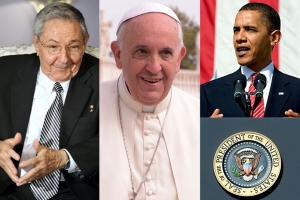June 30, 2015, published in TelesurTV
News last December that the United States and Cuba would work to restore diplomatic relations took the world by surprise. In effect, U.S. President Barack Obama admitted that his country’s half century attempt to defeat Cuba had failed. What also came as a shock to many observers was the role played by Pope Francis in helping secure this historic turn in U.S. policy toward Cuba.
According to statement released by the Vatican the same day the Cuban and U.S. presidents made their announcement, Pope Francis not only wrote letters to U.S. President Barack Obama and Cuban President Raul Castro, but hosted delegations from each country at the Vatican in order to facilitate the necessary dialogue.
Both Cuban and U.S. officials were vehement that the release of the five Cubans incarcerated for gathering information on terrorist groups in Miami, along with jailed U.S. government contractor Alan Gross was not a prisoner swap, although their release was a key component of the historic announcement. President Obama confirmed in his December speech that the release of Gross was integral to the decision to renew diplomatic relations with Cuba and that this very issue was touched upon by Pope Francis in his letter.
A U.S. official later told Time magazine that the Pope’s letter to both parties addressed the imprisonment of Gross and the Cuban Five. That official also confessed that Pope Francis’ letter “gave (U.S. officials) greater impetus and momentum for us to move forward.” Since the December announcement, progress between Cuba and the United States has been slow and not without significant obstacles, some of which have yet to be overcome.
In May the U.S. State Department finally removed Cuba from its list of state-sponsors of terrorism. Cuban officials had made clear that this change would be a precondition for the normalization of relations. Cuba was placed on the list March 1, 1982, amid a period of heightened tensions between the two countries in the midst of the Cold War. The U.S. government took great issue with the Cuban government’s support for national liberation movements throughout the world, particularly its support for guerrilla struggles in Latin America and Africa. However, then Cuban leader Fidel Castro announced in 1992 that supporting insurgents abroad was no longer an active Cuban policy.
Read the full article here.


Leave A Comment
You must be logged in to post a comment.